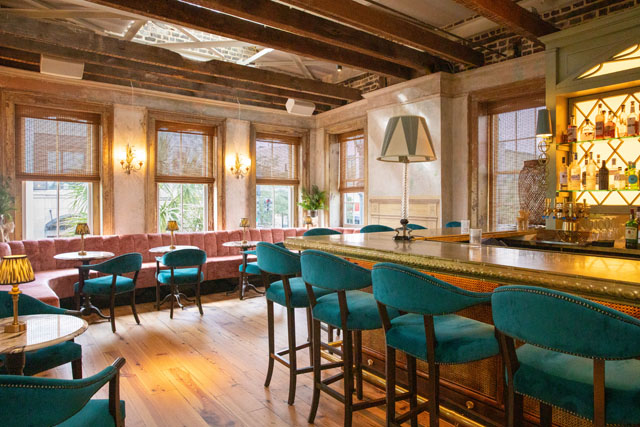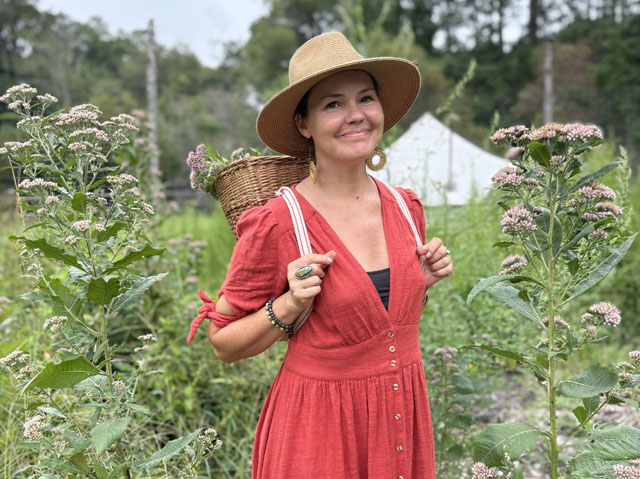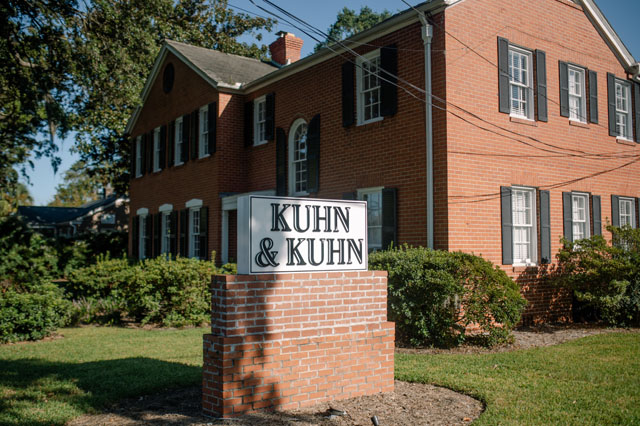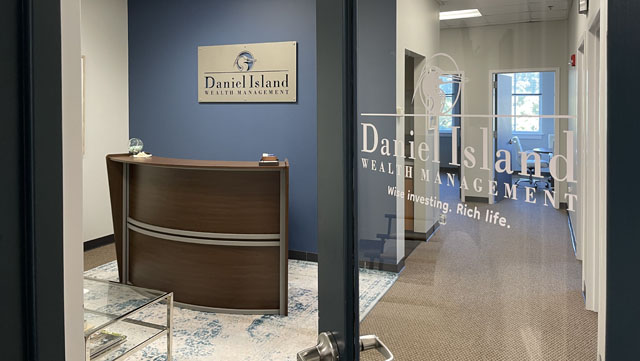Notable Charlestonians
06 Jan 2025
The Stories of Those Who Have Shaped our Community
The Gedney Howe Legacy
Three generations of legal service
By STRATTON LAWRENCE » Photos by NATHAN BELL, RICHARD BELL PHOTOGRAPHY
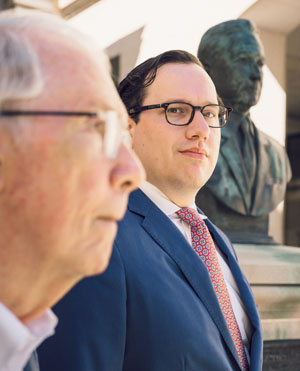
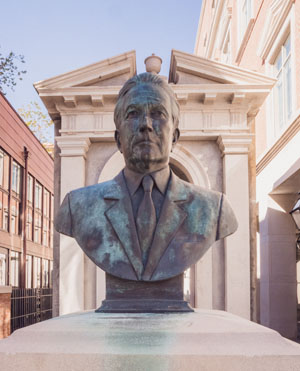
Gedney Main Howe IV looks face to face with his grandfather each time he walks into the courthouse in downtown Charleston. A bronze bust of Gedney Howe, Jr., stands just outside, in homage to the former solicitor, a legend of mid-20th century Charleston life.
"In this his beloved Charleston, he was the preeminent trial lawyer of the 20th century, yet his reach was broader than the law," reads the accompanying plaque, continuing, "With his genuine compassion, he was an eloquent counselor. With his tenacious courage, he was a lifelong champion of equal justice. With this generous heart, he made us seem better than we really are."
Rather than feel intimidated by the pressures of succeeding a life so lauded, subsequent Gedneys have risen to the occasion, continuing a legacy of legal service.
"Wherever we went, from the grocery store to a College of Charleston basketball game, everybody seemed to shake my dad's hand," recalls Gedney IV of his father, Gedney III, who has led the family law firm since Gedney, Jr.'s passing in 1981. "They'd say things like, 'You helped us when my brother had the accident,' or, 'Thank you for helping my sister after she was arrested.' It wasn't that they all knew him that impressed me—it was how many people were grateful that he'd made a positive difference in their lives."
Generations of Gedney Howes have made their mark in Charleston. Now, as Gedney IV takes the reins from Gedney III, he forges ahead with respect for his forefathers' examples.
Family Tradition
Gedney IV speaks with a Charleston brogue so thick that it's initially surprising coming from a 31-year-old. Our city has absorbed so many new residents in recent years that meeting a young person who sounds so identifiably Charlestonian becomes rarer each year. But Gedney IV's not putting on a show—until he's ready to make an impression on a jury.
In his first trial after completing his education at the University of South Carolina School of Law, Gedney IV represented a client injured by a desk that slipped while being transported on a dolly. The fresh attorney wheeled a dolly into the courtroom, demonstrating how the strap used during the accident could appear secure yet be ineffective when used improperly.
He demonstrated the strap technique to the jury, stomping his foot at the moment the incorrectly attached strap came loose, releasing the desk onto his client. Gedney IV recalls his father "turning purple" in the gallery as he dramatically reenacted the events. But he won the case, and Gedney III now gives him credit.
"I've got to give it to him—he stomps his foot at the right time," Gedney III says with a chuckle. "I can see him maturing and it makes me very proud of him."
Gedney IV punches back a bit, claiming that his father's early career antics make him look like "a wallflower." "There's a healthy dose of hypocrisy," laughs Gedney IV. "He forgets what he was like at 30 years old: a menace. But he was a winning menace."
The push-and-pull of following in big footsteps dates to Gedney Main Howe, Sr., known in the family as "Chief." Gedney served the city as a civil engineer and supported his son's ambitions as Gedney, Jr., attended The College of Charleston and then USC Law School. Gedney, Jr., founded his downtown law firm on Broad Street (now on Chalmers Street) and he and his wife, Marybelle, became pillars of the Charleston community. When the city's schools were finally integrated in 1963, Marybelle counseled her oldest son to befriend the new student, Millicent Brown.
"She said, 'A lot of people aren't going to be glad to see Millicent. You've got to make sure she feels comfortable and at home,'" Gedney III recalls.
He sat with Millicent at lunch that day and many days after. All four of Gedney, Jr.'s and Marybelle's children practiced law, including their daughter, Belle, who served on the Birmingham County School Board during their integration, facing personal intimidation from Ku Klux Klan leader David Duke.
"She did many things that required her to be brave," says Gedney III of his sister.
When nine church leaders and parishioners were massacred at Mother Emanual AME church in 2015, it was the Howe firm that lead the team representing the surviving families in their suit against the Department of Justice for selling a firearm to the shooter. The Howe family’s public support for civil rights underscores each of the Gedneys’ altruistic and rule-following inclinations. There’s little rebellion in the family story.
"Daddy was a great role model and very successful, so I tried to figure out what he did and do the same thing," says Gedney III.
Gedney IV says of his father, "When the other boys jumped on a train going through Hampton Park to see who could ride it, Dad didn't jump on."
Although Gedney IV toyed with the idea of being an engineer and then a game warden, he never truly strayed from his calling as an attorney. "When you're 18, you don't think a week in advance, but it was always part of my plan," he says.
When Gedney IV joined the family firm in 2020, "Little" Gedney III finally got to be "Big" Gedney, despite his son's towering 6'3" frame.
“I’ve been Little Gedney for 50 years,” Gedney III laughs. “It’s somebody else’s turn.”
Consistent Law in a Changing World
Gedney III's career spans both criminal defense and personal injury law, but the firm's focus over the last decade has defaulted to injury suits. Still, you won't see billboards on I-26 imploring you to call Gedney Howe if you've been hurt at work. In fact, Gedney III filed a lawsuit to fight advertising in the legal profession when ads first appeared. The legal system decided that ads weren't a direct solicitation of business, but the firm remained conservative in seeking publicity. The closest thing to an advertisement you might find is a magazine ad or an Instagram post.
Gedney IV admits that outside of spending time with his wife, Mae (his sweetheart at First Baptist High School), and their one-year-old daughter, his social interactions often end up supporting the family firm. An avid hunter who spent a year before law school assisting guided hunts in New Zealand, Gedney IV combines business with pleasure by getting outside with former and potential clients on the weekends. Gedney IV puts it, "There's a singleness of purpose to everything that I do. I don't do any marketing, but I stay in touch so that when someone needs help, they think of me."
Gedney IV seeks to remain a small-town attorney in an ever-growing city. He says it’s not uncommon to get a call from someone who says that his father or grandfather helped their grandmother and grew up being told, 'If you ever need help, let Gedney know.' "The way you become 'someone's lawyer' is by being there for them," says Gedney III.
It's a traditional approach to running a law practice. At 78 years old, Gedney III will retire without ever directly answering an email (he dictates replies to emails printed out on yellow paper by his assistant). When he restored the Calhoun Mansion (purchased in his mid-20s for $200,000) room by room, he let defendants work off their legal fees by laying bricks and repairing plaster. In conversation, he casually drops one-liners like, “There’s no education in the second kick of a mule.”
During the '70s, he represented several of the "gentleman smugglers" who were caught importing marijuana on shrimp boats. When he met his first cocaine smuggler, Howe says, “I realized these were not the same ‘rascals’ I’d been dealing with.” As a result, he began to shift away from criminal defense to civil practice.
Gedney IV says the firm's principles haven't changed, despite a changing legal climate. Ask him about any case currently with the firm and he can expound upon the details and family members involved. Every client has his cell phone number. There's no plan to grow.
"I want to be a lawyer. I don't want to run a business," says Gedney IV. "I just want continued opportunities to help nice people who deserve a little looking out for. If you work hard and get a little lucky, you’re going to get a chance to really help somebody.” gedneyhowe.com
A Delicious Commitment to Family Heritage
Making unforgettable food has been David Bessinger’s everyday life for the last four decades
By Liesel Schmidt » Photos by Ruta Smith
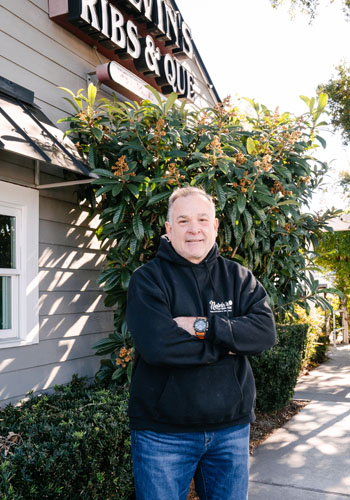
As anyone from the South knows, being a true Southerner comes with a tradition of manners and an unwavering commitment to family, faith and history. We do things a certain way because that’s the way they’ve always been done, and there’s a certain respect we have for that patina of tradition.
Naturally, that respect extends to the tradition of food. Food is inherently part of Southern culture, and in the Lowcountry, it comes with an expectation of flavor so deep it almost seeps into your bones. When you taste it, you taste generations of history marinating every morsel, seasoning it, tenderizing it. Making it unforgettable.
As the owner and co-founder of Melvin’s BBQ, making unforgettable food has been David Bessinger’s everyday life for the last four decades. Undeniably rooted in history, Melvin’s BBQ has been feeding hungry Charlestonians since it opened in 1982—though its origins began nearly five decades before, in the late 1930s, when David’s grandfather, Joseph Bessinger, started cooking and selling barbecue in Orangeburg, South Carolina. The elder Bessinger developed a unique mustard-based sauce that became a hallmark of South Carolina barbecue and passed on the recipe and the tradition to his son, Melvin, who learned the craft from a young age. In 1961, Melvin opened his first barbecue restaurant with his brother, Thomas, on Savannah Highway, which he operated for nearly 20 years before going on to establish a new restaurant with his son, David. The two opened Melvin's BBQ in Mount Pleasant in 1982. Two years later, a second location of Melvin’s opened on James Island.
Now more than 40 years later, David has turned Melvin’s BBQ into a landmark restaurant, carrying on the family tradition of his grandfather’s mustard-based barbecue sauce.
“Melvin's BBQ is my own take on the tradition, built upon the hard work and recipes passed down from my own father,” says David, who has been at the helm these last 40-plus years with a success that has earned Melvin’s recognition as one of the South's best barbecue spots in addition to garnering numerous local accolades. “Our barbecue stands out due to our commitment to traditional methods and our signature mustard-based sauce. We begin with selecting high-quality cuts of pork and we season the meat with our proprietary blend of spices and then smoke it over hickory wood coals for 24 hours. This low-and-slow method ensures the meat is tender and infused with a rich, smoky flavor. After smoking, we pull the pork by hand and serve it with our signature mustard-based sauce.”
Having been raised in barbecue, David has an intimate knowledge of the elements that are required to make truly excellent barbecue. “Barbecue is an art,” he says. “It requires a deep understanding of flavors, patience and meticulous attention to detail. It's not just about cooking meat—it's about selecting the right cuts, seasoning them perfectly and smoking them low and slow over hardwood to achieve tender, smoky perfection. Each step, from the choice of wood to the timing, contributes to the final masterpiece. Great barbecue is characterized by flavorful meat that reflects the care and time invested in its preparation. The balance of smoke, seasoning and sauce should enhance the meat’s natural flavors without overpowering them. Consistency in quality and a deep respect for traditional methods are also essential.”
Traditional methods of barbecue vary deeply from region to region—which is part of Melvin’s claim to fame as well as a reflection of its deep Lowcountry origins.
“Carolina barbecue, particularly in South Carolina, is distinguished by its use of mustard-based sauces, a tradition often attributed to German immigrants,” David explains, once again displaying a deep knowledge of his craft. “This contrasts with the vinegar-based sauces of Eastern North Carolina and the tomato-based sauces found elsewhere. The emphasis on pork, especially whole hog or pork shoulder, and the slow-smoking process over hardwood coals are also defining characteristics.”
Business is all about defining characteristics. And as a business owner—and as a Charlestonian—David Bessinger understands the importance of defining yourself in the community, especially the one you’re feeding. He’s built something special on the back of family tradition, and it all started with a sauce. melvinsbbq.com
The Heart of Mt. Pleasant
John Royall's hardware store has become an East Cooper institution
By Chuck Diggle » Photos by Priscilla Thomas
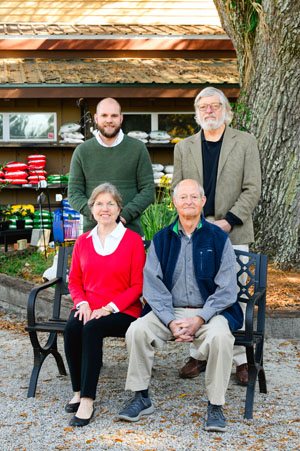
Not far from the glimmering facades of new chain stores and the ongoing development of Mount Pleasant, there remains a place off Ben Sawyer Boulevard where time seems to linger. Royall Hardware, nestled on the same intersection for nearly five decades, is more than a business—it’s a testament to the sustained charm of a town that has grown around it. At the heart of it all is John Royall, Jr., a lifelong resident and businessman whose handshake is as firm as his dedication to hard work and his support of his community.
In his nearly 78 years, John has watched Mount Pleasant transform from a sleepy coastal town of barely 1,800 residents to a bustling municipality of more than 90,000. Royall’s childhood was spent walking dirt roads of old Mount Pleasant, fishing, crabbing and spending time with friends. It was a simpler time, and it was during these formative years that John cultivated his strong work ethic.
“We didn’t have much money back then, so if you wanted something, you definitely had to work for it,” he said.
He earned pocket change by cutting grass and doing chores. By the time he was 15, he was working at Henry’s Outboards, a boat store once located on Coleman Boulevard. During his high school and college summers, he worked at the Darby Shipyard on Shem Creek. After serving in the U.S. Navy, he returned home to work for a sailboat-building business.
It was this work ethic and determination that allowed him to save up the money that helped him find his life’s calling right in his hometown.
“I was looking for something new and wanted to start a business in Mount Pleasant,” he explained. “I had this idea of renting equipment and tools, so I approached Willard’s Hardware.”
The small family operation was located in a building on the corner of Royall Hardware’s current property. Mr. Willard had passed away and the store was being run by his widow and other family members. She listened to his idea about an equipment rental business. After some thought, she asked him if he had ever considered running a hardware store. The spark was lit.
“In less than a month, she had sold me the building and the property and helped finance the purchase of the hardware business,” he said. It was 1976 and Royall Hardware was born.
Around that time, another life change presented itself. John met Julia at a party and they were immediately taken with each other. Soon, they were dating and she was helping him keep the books at his fledgling business.
“It wasn’t long after that, the good Lord told me, ‘Boy, you better hang on to this woman!’” he said with a laugh. “So we were married a year later.”
The couple, still working together daily, had three sons–John, Robert and William–who all worked at the hardware store with the family. John and Robert have moved on to other endeavors, but Will has stayed with the iconic family business, as has Royall's older brother, Robert, making it a true family affair.
“We’ve really been blessed,” John said. “The Lord’s been so good to us. I try to remember that and give back as much as I can.”
For the past 48 years, throughout all the growth and change, he has kept his hardware store a cornerstone of local service and maintained a sense of giving, both in his business and his personal life. He has donated money or merchandise to hundreds of fundraisers over the years, as well as local charities. He and Julia have participated in mission trips with the Mount Pleasant Presbyterian Church, where he also sings in the choir. He has given his time and business sense to multiple citizen groups for the Town of Mount Pleasant and has been a member of the Mount Pleasant Rotary Club for 30 years, as well as serving on boards of Charleston non-profits such as 180 Place. John has also performed with the Charleston Men’s Chorus for three decades.
Still, he remains humble about the success of his business, refusing to accept all the accolades himself.
“It’s amazing how blessed we’ve been with the many good, knowledgeable and service-oriented employees we’ve had over the years,” he said. “And my wife Julia, my son Will, and my brother Robbie are also vital parts of our success. Julia returned from retirement when we had staff shortages during the pandemic. Robbie can converse with and help anyone, even giving them a bit of preaching for good measure! And Will is great with customers, mechanically inclined and computer proficient. We’re all very fortunate to work together.”
John’s hard work and dedication to his family, his business, his community, and God are not only a reminder of the St. Francis of Assisi quote, “For it is in giving that we receive,” but are also testament to the idea that no matter how much the Charleston area grows, some things—the best things—never change. royallhardware.com
Stay Awhile
Michelle Woodhull remains a steward of historic inns in Charleston
By Jenna-Ley Walls » Photos by Priscilla Thomas
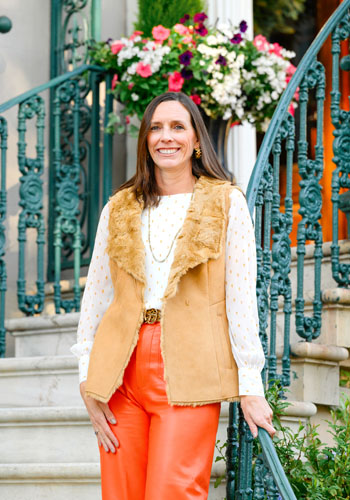
Southern charm, close-knit community, and historic beauty are the aspects of Holy City living that Charming Inns® President Michelle Woodhull loves most about her identity as a Charlestonian. Charleston is both the place she and her husband, Peter, and their two children call home and where she operates her family’s thriving hospitality business.
“My favorite part of being a Charlestonian is the sense of community—a group of incredible people who genuinely care for one another and for the beauty, history and unique landscape that make this city so special,” Woodhull said.
Since 2019, Woodhull has served in her entrepreneurial role; however, Charming Inns® has been a meaningful part of her family for more than a generation. Her father founded the company with the Kings Courtyard Inn® site in 1983; and as the daughter of a popular hotel executive, Woodhull often found herself in an exceptional world for a child.
“I spent my time exploring the historic streets and falling in love with the city’s unique beauty,” she said.
At the time, Charleston was her “summer retreat,” splitting her time between the East and West Coast and enjoying the “perks” of hotel life. As a child, Woodhull learned the art of customer service and helped around Kings Courtyard Inn®, which her father managed at the time, booking reservations and even serving breakfast to patrons when needed.
“I was immersed in the world of hospitality, spending time at the inn helping out wherever I could," she said.
Woodhull’s father later expanded Charming Inns® to also include restoration of other historic properties in the area, “each with its own unique charm and story," Woodhull explains.
Renovated sites operated by Charming Inns® now include some of downtown Charleston’s beloved boutique inns—John Rutledge House Inn®, Wentworth Mansion®, and Fulton Lane Inn. Additionally, the company boasts one of the city’s award-winning fine dining destinations, Circa 1886 Restaurant. Though he is no longer at the helm of Charming Inns®, Woodhull’s father’s vision still prevails.
“His passion for preserving Charleston’s history continues to inspire everything we do,” she said.
Woodhull also pointed out how lodging at one of Charming Inns’® historic sites compares to a chain hotel is a vastly different experience—the key distinction being that of Southern hospitality, in addition to unique architecture, rich history and culture.
“When you walk into one of our inns, we want you to feel at home, like you’re part of our family,” Woodhull said.
And engaging with guests is one of Woodhull’s favorite parts of the job. By staying hands-on across the inns and restaurant, she can truly get to know the individuals and families lodging and dining within them. It also gives her opportunity to watch her dedicated staff—about 100 total—in action. She even considers them “the heart and soul” of the business.
“Seeing their efforts celebrated feels like a proud mom moment every time,” Woodhull said. “Their passion and commitment inspire me daily.”
But she’s not the only one who’s recognized her team’s hard work. Woodhull and her family have also been honored for their hospitality endeavors—her favorite and “proudest moments” to date being their receiving of the prestigious Historic Hotels of America Legendary Family Historic Hoteliers Award.
“The recognition was a testament to the hard work and passion we’ve poured into preserving Charleston’s history through our inns,” Woodhull said.
In addition to investing in the guest experience, Charming Inns® gives back to the community. Philanthropic efforts over the years have focused on local charities with connections to the hospitality industry—each charity's mission mirroring the company’s values.
“We feel a deep responsibility to invest in the well-being of the Charleston area,” Woodhull said.
She additionally serves on the boards of Palmetto Goodwill, the Lowcountry Hospitality Association, the Board of Governors for the Charleston Convention and Visitor's Bureau, and the South Carolina Restaurant and Lodging Association. Woodhull also mentors College of Charleston MBA students studying the hospitality industry.
In the years to come, Woodhull hopes to continue preserving the company’s success while also using fresh concepts and services to build upon Charming Inns’® esteemed name as a “leading force in Charleston’s hospitality scene.”
“I hope to expand our legacy by introducing new and innovative ways to enhance our guests' experiences while maintaining the unique charm of our properties,” she said. “I want to leave a lasting impact on the industry and community, just as my family has over the years.” charminginns.com
Awendaw’s Ambassador
Tim Penninger preserves the legacy and charm of his small town
By Pamela Jouan » Photos by Priscilla Thomas
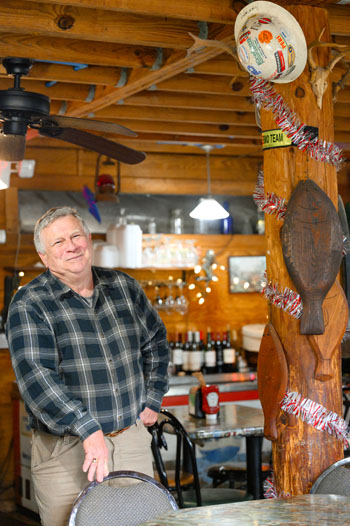
Talking to Tim Penninger is easy, like a Sunday morning. He slips into memories growing up in the town of Awendaw, just north of Mt. Pleasant, as effortlessly as a shrimp boat gliding out to sea at dawn—steady, unhurried, and laden with stories as timeless as the tides.
Some of those tales have been preserved in the pages of a book he authored in 2008. Awendaw: Tim Penninger in Conversation with William Baldwin, with a preface by Selden Bud, remains a treasure you can still find at The Village Museum in McClellanville, another nearby small town.
For many, Tim’s name is synonymous with his mother’s, Mary Rancourt, a local legend in these parts. At a spry 89 years, Mary still owns and operates the beloved See Wee Restaurant. Originally purchased as a grocery store in 1959 when Tim was just three years old, it has stood as a cornerstone for the community, serving a clientele that once walked the well-worn paths along Highway 17 and its side roads to shop for provisions.
Grocery stores were the lifeblood of their family. Mary’s father and uncles owned stores in and around Santee, S.C. It was a family tradition until Mary reimagined the grocery store as an eatery in 1993. In a full-circle moment, the little boy who once did his homework in the back of the grocery store now serves as its general manager, ensuring the legacy of both the Southern home cooking restaurant and his family’s enduring connection to the community.
“We know a lot of people in these parts,” Tim says with a warm smile. “We support the local churches’’ ‘buy a pew’ fundraisers, invest in our schools and are always here to welcome back students-turned-teachers who stop by with special requests for their classrooms. When one of our own passes away, we make sure to send provisions to the wake. It’s important to us to be a good neighbor.”
And what a neighborhood it is. Tim speaks of Awendaw’s history while fondly recalling the ease of sea breezes brushing through the area's sweetgrass marshes. Growing up, he spent hours exploring its untouched terrain, uncovering artifacts scattered across fields and forests. His book draws on those treasures, some dating back 12,000 years, while others were uncovered from World War I. Many of these artifacts now reside in museums, but a select few adorn the shelves of the See Wee Restaurant, displayed alongside items gifted by friends and neighbors—each piece a testament to the rich tapestry of community and history.
Tim’s connection to the land runs as deep as the roots of the live oaks that shade it. Though tempted once or twice to leave the area for work, he knows he is happiest when the scent of pluff mud fills his lungs. His contributions to Charleston have stretched far beyond Awendaw’s borders.
During his years working for the South Carolina Department of Transportation, Tim earned a reputation as an expert in his field, completing countless college-accredited construction courses. When the Ravenel Bridge was under construction, he served as the senior steel and concrete inspector, helping to shape the iconic structure while overseeing the demolition of the old bridge. Charleston’s call didn’t stop there—when the city needed expertise for a tunnel project, Tim stepped up once again. Lowered 100 feet underground in a man-basket, he worked in sweltering, narrow spaces to address flooding and sewer issues, navigating 12-foot-wide tunnels on little electric trains. “It was hot and humid, and while I’m not claustrophobic, I had to steady my nerves to work down there,” he recalls with a laugh.
Beyond his engineering contributions, Tim served as a council member for the Town of Awendaw in 2013 and served for eight years, chairing the Roads and Ditches Committee and spending 20 years on the Planning Commission. Even now, residents often reach out for his perspective on town matters, a testament to his enduring influence.
Awendaw’s pristine beauty, with its rivers, bays, and forests, has long resisted heavy development—but Tim knows change is inevitable.
“Growth is coming,” he says thoughtfully. “Natural borders will limit industrial work, but subdivisions will follow as soon as sewage systems reach out here.”
For Tim, legacy is not measured in roads or bridges but in the small moments of connection. “The best thing is when someone says, ‘He always made me smile.’ If you leave a conversation knowing someone was glad to see you, that’s a good day in my book,” Tim said. Judging by the cheerful faces at See Wee Restaurant, plenty of folks would agree. seeweerestaurant.com


